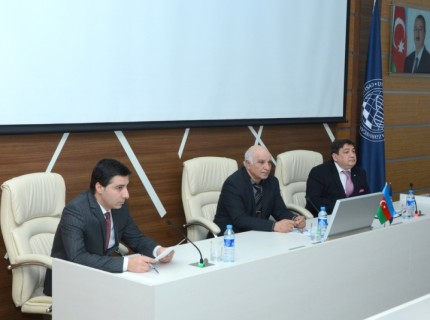A Scientific Workshop held at UNEC: “Azerbaijan’s Economy over the last year”
A scientific workshop has been held at UNEC. The seminar was dedicate to the results of socioeconomic development of 2016 and tasks ahead held by the Cabinet of Ministers under the chairmanship pf the President of the Republic of Azerbaijan Ilham Aliyev.
Director of the Science Department, Professor Zahid Mammadov made a speech within the seminar organized by the Scientific Research Institute of Economic Studies under UNEC. Drawing to attention the ideas by the President Ilham Aliyev, his instructions and recommendations, the reporter spoke about the achievements gained within the period and upcoming obligations. He said in the world, including European countries, the ongoing economic crisis, a sharp decline in oil prices, however, under the guidance of the head of state of a number of sectors of the economy, including industry, agriculture and real growth in the sector. The statistic indicators recorded last year provides ground to say this. Z.Mammadov noted the minister of economic development that emphasizes the very important steps have been taken the decision signed by the president this year, said that the law and the orders. To further deepen economic reforms and the development of non-oil sector.
UNEC Professor Mahish Ahmadov, Arif Shakaraliyev, Irshad Kerimli, Advisor to the Rector Elshan Baghirzade, Head of the International School of Economics Anar Rzayev and Scientific Secretary of the SRIES Rafail Rzayev, Heads of Departments Rashad Huseynov, Murad Bagirzade, senior scientists of the SRIES Elman Ibishov and Salman Najafov made speeches on different aspects of the issues discussed. They made proposals peaking about the current situation and trends in the national economy. It happened in the fall in oil prices on world markets amid the global crisis. As a result, the flow of foreign exchange into the country reduced. During the year, the exchange rate of the Azerbaijani manat trends has continued to drop. Financial mechanisms in order to solve the problem, but also highlighted the need for the use of international experience. The non-oil sector and to increase the export potential of the country in this way, the creation of highly competitive regional clusters, and thus further improve the investment climate of the country’s accession to the provision of global supply chains has been reproduced.

